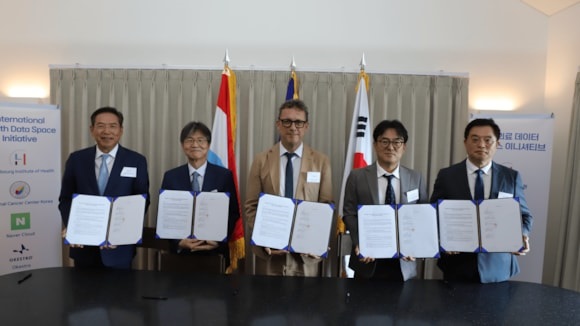 Credit: LIH
Credit: LIH
On Monday 21 July 2025, the Luxembourg Institute of Health (LIH) reported that a global partnership (of which it is part) is launching the International Health Data Space Initiative
(IHDSI) to accelerate AI-driven precision medicine and cancer research.
In their efforts to revolutionise data-driven healthcare, a consortium of leading research and technology institutions from Luxembourg, the United States of America and South Korea have announced the launch of the IHDSI. This initiative aims to establish a federated, secure and privacy-compliant infrastructure designed to enable health data integration, joint clinical research and translational innovation, with an initial focus on precision medicine in cancer and other complex diseases.
Spearheaded by the LIH and the National Cancer Center Korea (NCCK), alongside strategic technology partners NAVER Cloud Corporation, Okestro Co, Ltd and Cipherome, Inc, IHDSI is described as a "landmark collaboration". It seeks to overcome traditional data silos by enabling sovereign and legally compliant access to health data across international jurisdictions, aligning with European Health Data Space (EHDS) regulations and protocols such as GAIA-X.
According to LIH, IHDSI sets forth a "transformative vision" for global health by aiming to establish a long-term strategic alliance centred on data-driven and patient-centric healthcare innovation. The initiative is committed to creating and validating a federated research infrastructure that supports both digital and clinical research. It is expected to facilitate multi-institutional, translational cancer research across international boundaries and enable AI-driven analytics that preserve patient privacy. Furthermore, IHDSI seeks to ensure secure and interoperable access to health data, in full alignment with the EHDS framework.
Initial research activities will concentrate on two major areas led by the LIH and the NCCK. First, a prospective bladder cancer cohort will be established to collect clinical and multi-omics data, aimed at identifying biomarkers and developing precision oncology strategies. Second, a Parkinson's disease cohort will be used to conduct a feasibility study, validating the performance and utility of the federated data connector within real-world clinical research settings.
NAVER Cloud Corporation, Okestro Co, Ltd and Cipherome, Inc will develop the technological infrastructure to support IHDSI. Their responsibilities will include the development and deployment of a federated data connector that complies with GAIA-X and EHDS standards. They will also develop and validate cloud-based federated clinical data analysis capabilities along with highly scalable cloud computing resources and secure virtual environments. Additionally, these partners will design and implement governance models that support privacy-preserving data analytics across institutions and jurisdictions.
Dr Ulf Nehrbass, CEO of LIH, underscored the global importance of this collaboration: "We are proud to co-lead this strategic initiative that will fundamentally reshape how health data is accessed and used for research. IHDSI exemplifies our shared commitment to overcoming fragmentation and enabling global collaboration to accelerate precision medicine, particularly in cancer treatment."
Dr Geon Kook Lee, Director of the Research Institute at NCCK, echoed this sentiment: "This partnership represents a critical leap forward in our efforts to build robust, privacy-conscious infrastructure for international clinical research. By connecting our expertise with global partners, we can unlock transformative insights for patient care that no institution could achieve alone."
The participating institutions have committed to contributing financial, technical and human resources required for executing these collaborative activities, contingent upon securing necessary funding from public, institutional or private sources.
To ensure coherent implementation, a Joint Steering Committee (JSC) will be established to guide strategy and high-level coordination. Technical and Clinical Working Groups will manage deliverables in research, infrastructure and compliance, and annual review meetings will be held to monitor progress, share results and refine next-phase planning.








